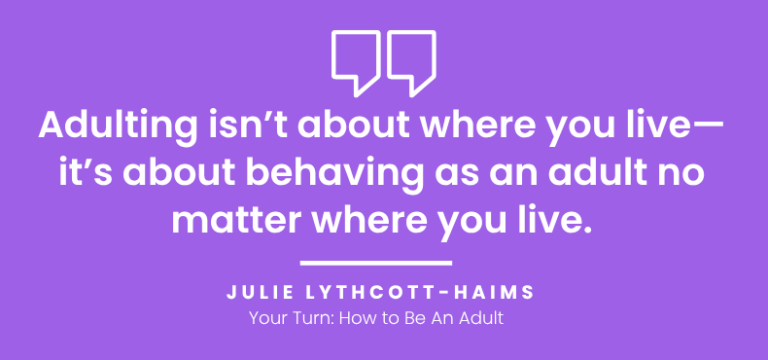Graduation is a proud milestone—but for many families, the next step brings unexpected tension: your college graduate is living at home again.
In fact, more than half of young adults in the U.S. now live with their parents, a trend not seen since the Great Depression. It’s no wonder the situation made headlines when a Jeopardy! contestant jokingly called himself a “stay-at-home son”. His humor struck a nerve with parents navigating the same scenario: adult kids back in their childhood bedrooms, unsure of next steps.
Whether your grad is job hunting, working full time, or simply decompressing after a whirlwind senior year, sharing a home again can be both heartwarming and hard.
The good news? With the right structure, your relationship can thrive—and avoid the classic blowups.
Here are 6 clear, respectful ways to set boundaries when your college graduate moves back home.
Jump To:
1. Rebuild the Relationship With Your College Graduate Living at Home
Your grad may be back under your roof, but they’re no longer the teen who left for college.
They’ve learned independence, made real-world decisions, and faced tough challenges. It’s important to acknowledge their growth and reset your dynamic.
Instead of reverting to old habits, open with something like:
“Now that we’re living together again, let’s talk about how to make this work for both of us.”
This mindset shift fosters respect and collaboration—not control.
“Treating your grad as an adult encourages respect—not power struggles.”
You’ll avoid defaulting to power struggles and create space for a more adult-to-adult connection.
Want to avoid the most common parenting pitfalls in this phase? Learn how to avoid common patterns that create power struggles.

2. Set Expectations for Chores, Cars, and Contributions
Even if your grad is in a transition period, they’re still a member of the household. That means they contribute to keeping it running smoothly.
Talk through:
- Household chores—who does what, and when?
- Laundry routines—are they responsible for their own?
- Car usage—who gets the car, under what conditions, and who pays for gas or maintenance?
Try using a simple When–Then statement:
“When your household responsibilities are done, then the car is available.”
This avoids nagging and teaches real-world responsibility. It also aligns with natural consequences and earned privileges, which your young adult will encounter everywhere—from employers to landlords.
3. Talk About Rent When Your College Graduate Is Living at Home
Money can be tricky—but avoiding the topic creates confusion.
Will your college graduate living at home contribute to rent, groceries, or household expenses?
Here’s a simple structure to follow:
- Grace period: If they’re job hunting, offer a short window to get settled.
- During that time: Expect meaningful help at home—prepping meals, running errands, or driving siblings.
- Once employed: Introduce modest rent—enough to build responsibility, but far below market value.
“Small contributions build real-life habits—and ease your financial burden, too.”
If they’re new to budgeting, share this guide to creating and sticking to a budget. These small steps prepare them for financial independence—and reduce the odds they’ll feel stuck at home.
Some parents even set aside the rent payments and return them as a “launch gift” when their child moves out.
4. Respect Their Downtime—Without Hovering
After college, many grads need time to decompress. They may sleep in, scroll their phones, or avoid talking about job applications.
Instead of checking in daily, try this approach:
“Let’s have a Sunday check-in so we can stay on the same page, but you have space during the week.”
This lightens the emotional load, while still allowing room for guidance. If they’re working, ensure that household expectations are still fairly shared.
Want to help them build structure for job search or part-time work? Our tips on building follow-through and time management can help.
5. Be Upfront About Romantic Overnight Guests
This boundary can feel awkward—but it’s important. If romantic overnight guests feel uncomfortable, it’s completely fine to say so.
Try this phrasing:
“We’re so glad you’re here—and we want everyone to feel comfortable. That means no romantic overnight guests while you’re living at home.”
Most grads appreciate honesty delivered respectfully—and expectations truly help relationships stay smooth.
6. Keep Connection Strong While Your College Graduate Lives at Home
Independence is growing—but connection remains essential. Offer low-pressure ways to stay close:
- Take a walk together
- Watch a favorite show
- Offer résumé support if they’re open to it
Let your house feel like a calm, respectful place—not just a crash pad. Focused connection fosters trust and healthy growth.
Final Thoughts
Having your college graduate living at home can feel like a step backward—but it’s actually a unique opportunity for growth on both sides. Your young adult is stepping into a new stage of life, and so are you as a parent.
When you set clear boundaries, communicate with respect, and stay grounded in connection, this season can be more than just a pit stop. It can be a bridge—between childhood and full independence, between past roles and a new, adult-to-adult relationship.
You’re not just sharing space. You’re building trust, clarity, and a foundation for their next chapter.




